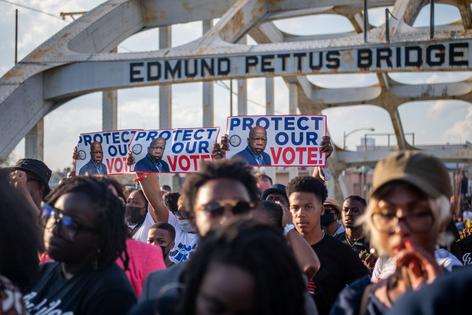Supreme Court rules in favor of Black voters in Alabama and protects landmark Voting Rights Act
Published in Political News
In a surprising ruling on June 8, 2023, the conservative leaning U.S. Supreme Court threw out Republican-drawn congressional districts in Alabama that a lower court had ruled discriminated against Black voters and violated Section 2 of the Voting Rights Act of 1965.
At issue in the case that was before the court, Allen v. Milligan, was whether the power of Black voters in Alabama was diluted by dividing them into districts where white voters dominate. After the 2020 census, the Republican-controlled Alabama legislature redrew the state’s congressional districts to include only one out of seven in which Black voters would likely be able to elect a candidate of their choosing.
Black residents make up about 27% of the state’s population, and voting rights advocates argued that they deserved not one but two political districts.
Rodney Coates is a sociologist who studies race and ethnicity and has followed efforts by politicians throughout American history to use redistricting to disenfranchise Black voters. The Conversation asked him four questions about the ruling and its implications.
The decision means that Black voters in Alabama, and across the country, will retain the last remaining voter rights protections. Specifically, Alabama lawmakers will need to redraw their legislative districts to include two districts that reflect the Black population.
The Voting Rights Act of 1965 was enacted to prohibit racist practices by Southern states that were used to prevent Black people from voting. Those measures included literacy tests, poll taxes and voter intimidation.
Prior to the law’s passage, less than a quarter of voting-age Blacks were registered to vote across the nation. In 1969, that figure had risen to 61%.
The ruling will also set an important precedent for redistricting cases alleging discrimination as voters and their representatives challenge state maps. Among Democrats there is the belief that the ruling will impact pending cases and require Alabama, as well as Louisiana and Georgia, to add new majority-minority districts prior to the next congressional elections.
The ruling in Allen vs. Milligan was a surprise because of the voting by conservative Chief Justice John Roberts Jr. and Justice Brett M. Kavanaugh with the three liberal justices.
In his opinion for the majority, Roberts traced the importance of Section 2 of the Voting Rights Act. He explained how racially motivated voter suppression after the Civil War led to the initial passage of the 1965 Voting Rights Act.
In order to avoid creating racially designated legislative districts, Congress established that the electoral process should allow for the equal participation of all racial groups, Roberts wrote in his opinion.
Roberts’ thinking in Allen vs. Milligan is radically different from the one he held when he was an attorney serving in the U.S. Department of Justice during the Reagan administration. Then, Roberts wrote 25 memos in opposition to the VRA, specifically in reference to section 2.
Only Roberts knows why his perspective has changed over time. But perhaps Alabama went too far, too fast and was too partisan.
“States shouldn’t let race be the primary factor in deciding how to draw boundaries but it should be a consideration,” Roberts wrote. “The line we have drawn is between consciousness and predominance.”
Roberts went further by citing the repugnant racial history of Alabama.
Even as the Black population increased to over 27% of the state’s population over the past 30 years, the number of Black districts remained at one, largely because white conservatives have used their control of the state legislature to dilute the strength of Black voters.
While a breath of fresh air for voting rights activists, this ruling does not mean that white conservatives will cease their attack.
GOP-controlled congressional maps diluting or eliminating Black districts have been drawn in multiple states, including Louisiana, Georgia, Ohio and Texas. These efforts could significantly alter the 2024 electoral map.
Several lawsuits are currently working their way through the courts across the country in states such as Florida, Arkansas, South Carolina and New York.
Across the country, there has been a concerted effort to restrict voting and control the election machinery and even the outcome of these votes.
Dozens of Republican-controlled states have passed a series of laws that will curtail voting of Blacks and many other Americans.
These laws are in Florida, where registration is harder; in Nebraska, which has enacted more stringent voter identification measures; in Mississippi, which placed restrictions on absentee ballots; and in Georgia, which increased voter scrutiny by allowing anyone to challenge the qualifications of other voters.
Uncertainty prevails at the state and federal level, and according to Congressional Black Caucus Chairman Steven Horsford, only a national law aimed at eliminating the various suppression tactics that target Black voters will remedy the situation.
As many as 42 restrictive voting-rights laws in 21 states have been passed since 2021.
Among these, 33 contain at least one restrictive provision that will impact elections in 20 states. These restrictive provisions would make it harder for eligible Blacks to vote.
These laws are being vigorously challenged by groups such as the ACLU, NAACP, League of Women Voters, Fair Fight Action and the Southern Poverty Law Center, which are mobilizing protests, organizing voters and launching legal challenges.
This article is republished from The Conversation, an independent nonprofit news site dedicated to sharing ideas from academic experts. Like this article? Subscribe to our weekly newsletter.
Read more:
Why a federal judge found Tennessee’s anti-drag law unconstitutional
Supreme Court is poised to dismantle an integral part of LBJ’s Great Society – affirmative action
Rodney Coates does not work for, consult, own shares in or receive funding from any company or organization that would benefit from this article, and has disclosed no relevant affiliations beyond their academic appointment.


























































Comments